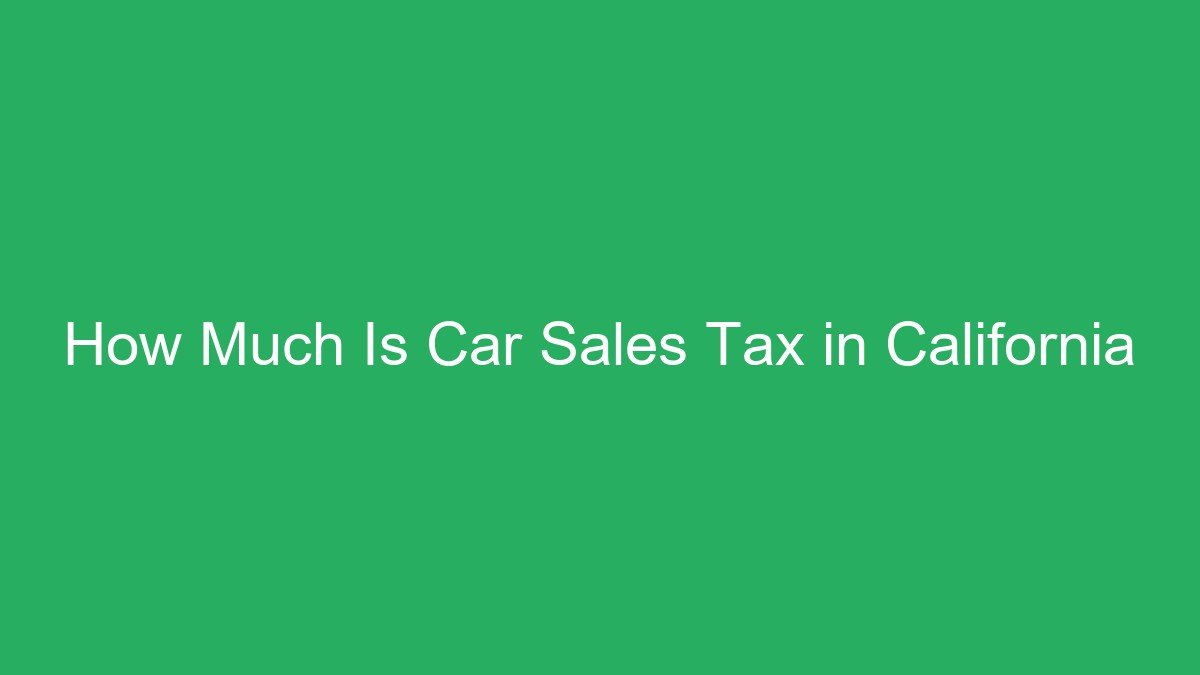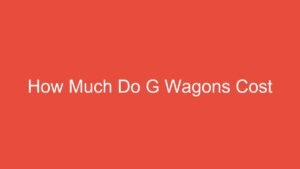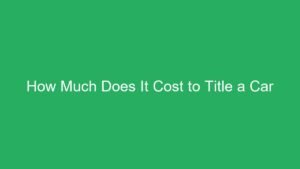
Contents
- Demystifying California Car Sales Tax: Your Complete Guide to What You’ll Pay
- What Exactly is Car Sales Tax?
- 🛒 Recommended Product
- The Big Question: How Much is Car Sales Tax in California?
- What Exactly Gets Taxed? (The Taxable Amount)
- 🛒 Recommended Product
- Step-by-Step: Calculating Your California Car Sales Tax
- Important Nuances & Special Cases
- Tips for Navigating Car Sales Tax
- Common Mistakes to Avoid
- Frequently Asked Questions (FAQs)
- Drive Off with Confidence!
- 🛒 Recommended Product
- FAQ
Demystifying California Car Sales Tax: Your Complete Guide to What You’ll Pay
Buying a new or used car in California is an exciting adventure! The thrill of picking out your perfect ride, the test drive, and the negotiation – it’s all part of the fun. But then comes the paperwork, and often, the confusing question: “How much is car sales tax in California?”
Don’t let the numbers put a damper on your new car euphoria. Understanding California’s car sales tax doesn’t have to be a mystery. We’re here to break it down for you in a friendly, helpful way, ensuring you can budget accurately and drive off with confidence.
What Exactly is Car Sales Tax?
At its core, sales tax is a percentage of the purchase price of goods or services that you, the buyer, pay to the state government. When it comes to cars, this tax contributes to various state and local public services. In California, this applies to both new and used car purchases, whether from a dealership or a private party (though the collection method differs slightly for private sales).
🛒 Recommended Product
The Big Question: How Much is Car Sales Tax in California?
Here’s where it gets a little nuanced, but don’t worry, we’ll make it clear.
California has a statewide base sales tax rate of 7.25%.
However, that’s rarely the only sales tax you’ll pay. Most cities and counties in California have their own local district taxes that are added on top of the statewide rate. These local taxes can vary significantly, usually ranging from 0.10% to 2.5% or more, depending on your specific location.
This means your total car sales tax rate could be anywhere from 7.25% to over 10%!
For example:
- If you buy a car in a county with a 1.0% district tax, your total sales tax rate would be 7.25% (state) + 1.0% (local) = 8.25%.
- In Los Angeles County, many areas have a combined rate of 9.50% or even higher due to multiple district taxes.
Key Takeaway: The exact sales tax you pay depends on where the vehicle is delivered and registered. Even if you buy the car in one county but register it in another, the tax rate for the delivery/registration address applies.
What Exactly Gets Taxed? (The Taxable Amount)
The sales tax isn’t just on the sticker price. It’s applied to the net purchase price of the vehicle. Here’s what that typically means:
- Negotiated Sale Price: This is the price you and the dealer agree upon, before any other fees or taxes are added.
- Trade-in Value: This is a big one! In California, if you trade in your old vehicle, its value is deducted from the new car’s purchase price before sales tax is calculated. This can significantly reduce your taxable amount and, therefore, your total tax bill.
- Example: If you buy a car for $30,000 and trade in your old car for $5,000, you only pay sales tax on $25,000 ($30,000 – $5,000).
- Manufacturer Rebates/Incentives: Often, manufacturer rebates (cash back directly from the car maker) are also deducted from the purchase price before sales tax is applied.
- Note: This usually applies to manufacturer rebates, not dealer discounts, which are already factored into the negotiated price. Always clarify with the dealer.
What is NOT taxed as part of the sales price:
- DMV registration fees
- License plate fees
- Documentation fees (Doc Fees)
- Smog certification fees
- Tire disposal fees
- Extended warranty costs (if purchased separately from the vehicle price)
These are separate charges that come after sales tax calculation.
🛒 Recommended Product
Step-by-Step: Calculating Your California Car Sales Tax
Ready to crunch some numbers? Here’s a simple guide:
- Determine Your Negotiated Purchase Price: This is the price you and the seller (dealership or private party) agree upon for the car itself, before any fees, taxes, or trade-ins.
- Subtract Any Trade-in Value: If you’re trading in a vehicle, deduct its agreed-upon value from your negotiated purchase price. This gives you your initial taxable amount.
- Example: $30,000 (Car Price) – $5,000 (Trade-in) = $25,000
- Subtract Any Manufacturer Rebates: If you qualify for any manufacturer rebates that reduce the taxable amount, subtract those from your total.
- Example: $25,000 – $1,000 (Rebate) = $24,000 (Your final taxable amount)
- Find Your Specific Local Sales Tax Rate: This is the most crucial step. You can find the exact sales tax rate for any California address by visiting the California Department of Tax and Fee Administration (CDTFA) website and using their “Sales & Use Tax Rate Search by Address” tool. Simply enter the address where the vehicle will be registered.
- Let’s assume your local rate is 9.00%
- Calculate the Sales Tax: Multiply your final taxable amount by your local sales tax rate.
- Example: $24,000 (Taxable Amount) x 0.0900 (9.00% Sales Tax Rate) = $2,160 in Sales Tax**
Congratulations! You now have a clear estimate of your car sales tax. Remember, this is just the sales tax; you’ll still have other DMV fees and registration costs.
Important Nuances & Special Cases
- Private Party Sales (Used Cars): When you buy a used car from a private party (not a dealership), you still pay tax! This is called “Use Tax” in California, and it’s collected by the DMV when you register the vehicle. The tax rate is the same as the sales tax rate for your registration address. Many people overlook this and are surprised by the tax bill at the DMV.
- Leased Vehicles: If you lease a car in California, you typically pay sales tax on your monthly lease payments (including any down payment that acts as a “capitalized cost reduction”), rather than the full purchase price of the vehicle upfront.
- Out-of-State Purchases: If you buy a car in another state but intend to register and use it in California, you will likely pay California’s Use Tax when you register the vehicle at the DMV. If you paid sales tax in the other state, California may give you a credit for that amount, but you’ll still pay the difference if California’s rate is higher. You typically have 10 days to register an out-of-state vehicle once it enters California.
- Exemptions: Sales tax exemptions for vehicles are extremely rare and highly specific in California. Don’t assume your vehicle qualifies unless you have clear documentation from the CDTFA.
- Always Budget for Sales Tax (and Other Fees): Don’t just focus on the car’s price. Sales tax, registration, and other fees can add thousands to your total cost. Have a clear understanding of the full out-the-door price.
- Know Your Local Rate BEFORE You Shop: Use the CDTFA website to pinpoint the exact sales tax rate for your home address. This empowers you during negotiations and helps you budget accurately.
- Understand the Impact of Trade-ins: If you have a trade-in, clearly understand its value and how it reduces your taxable amount. This is one of the most effective ways to lower your sales tax bill.
- Ask Questions: Don’t hesitate to ask the dealership’s finance manager to clearly break down the sales tax calculation for you.
- Verify All Calculations: Before signing anything, double-check all the numbers, especially the sales tax, to ensure it aligns with your understanding.
Common Mistakes to Avoid
- Forgetting About Local District Taxes: Many people only know the 7.25% statewide rate and are surprised by the higher total when local taxes are added.
- Ignoring Use Tax on Private Party Sales: Thinking you “avoid sales tax” by buying from a private seller is a costly misconception. The DMV will collect use tax.
- Not Budgeting Enough: Underestimating the total cost of ownership (including taxes and fees) can lead to financial strain.
- Confusing Rebates and Discounts: Not all price reductions affect the taxable amount in the same way. Always confirm if a specific rebate or discount will reduce the base price before tax.
- Assuming Sales Tax is Only for New Cars: Both new and used vehicles, whether from a dealer or private seller, are subject to sales/use tax in California.
Frequently Asked Questions (FAQs)
Q: Is there sales tax on used cars in California?
A: Yes! Whether you buy from a dealership or a private party, you will pay sales tax (or use tax for private party sales) on used cars in California.
Q: Does my trade-in reduce the sales tax I pay?
A: Absolutely, yes! In California, the value of your trade-in vehicle is deducted from the purchase price before sales tax is calculated, saving you money.
Q: How do I find the exact sales tax rate for my specific address?
A: The best way is to visit the California Department of Tax and Fee Administration (CDTFA) website and use their “Sales & Use Tax Rate Search by Address” tool.
Q: Are registration fees and sales tax the same thing?
A: No, they are separate. Sales tax is a percentage of the car’s price. Registration fees are annual fees collected by the DMV to legally operate your vehicle, which include license plate fees, vehicle license fees, and other smaller charges.
Q: When do I pay the car sales tax?
A: If you buy from a dealership, they will collect the sales tax from you and remit it to the state. If you buy from a private party, you will pay the use tax directly to the DMV when you register the vehicle.
Drive Off with Confidence!
Understanding California’s car sales tax can seem daunting, but by breaking it down into manageable steps and knowing what to expect, you can approach your car purchase with a clear financial picture. Remember to factor in your local tax rate, leverage any trade-in value, and always ask questions.
🛒 Recommended Product
Now, you’re ready to make that informed decision and enjoy the open roads of California in your new ride, knowing exactly what you’ve paid for!
FAQ
Q. What is the statewide car sales tax rate in California?
A. The statewide sales tax rate for vehicles in California is 7.25%. This is the base rate before any additional local district taxes are applied.
Q. Are there additional local sales taxes I need to consider when buying a car in California?
A. Yes, in addition to the statewide 7.25%, many cities and counties in California impose their own district sales taxes. These can add anywhere from 0.10% to over 2.0% to the total sales tax, making the combined rate typically range from 7.25% to around 10.25% depending on where the vehicle is purchased and registered.
Q. How is the total car sales tax calculated in California?
A. Car sales tax in California is calculated based on the agreed-upon purchase price of the vehicle, which typically includes any dealer-installed accessories. It generally excludes registration fees, smog fees, and certain dealer documentation fees (DOC fees) which are not taxable. The applicable state and local sales tax rates are then applied to this taxable amount.
Q. Does a trade-in reduce the amount of sales tax I pay on a new car in California?
A. No, California is one of the states that does not offer a sales tax credit for trade-ins. The sales tax is calculated on the full purchase price of the new vehicle before any trade-in value is deducted.
Q. Do I have to pay sales tax on a car purchased from a private party in California?
A. Yes, when you purchase a vehicle from a private party in California, you are still required to pay sales tax (referred to as “use tax” in this context) to the California Department of Motor Vehicles (DMV) when you register the vehicle. The tax is based on the purchase price or the vehicle’s market value, whichever is higher, and the applicable sales tax rate for the county where you register the car.
Q. Are there any common exemptions or discounts on car sales tax in California?
A. Generally, there are very few broad exemptions for vehicle sales tax in California. One notable exception is for vehicles primarily used for interstate commerce. However, there are no general sales tax exemptions for specific vehicle types like electric vehicles or hybrids, or for specific buyer demographics. Any specific programs would be rare and highly specialized, often temporary.
Q. How is sales tax applied to a car lease in California?
A. When you lease a car in California, you typically pay sales tax on the monthly lease payments, rather than the full purchase price of the vehicle upfront. The tax is calculated on the portion of the lease payment that goes towards the depreciation and any finance charges.
Q. What if I buy a car out of state and bring it to California?
A. If you purchase a vehicle out of state and subsequently register it in California, you will generally be subject to California’s “use tax” if you did not pay sales tax in the state of purchase at a rate equivalent to or higher than California’s rate. This use tax is equivalent to the sales tax and is paid to the California DMV when you register the vehicle.
Related Articles
How Much Does a Tesla Cybertruck Cost
How Much Does a Tesla Cybertruck Cost? Your Ultimate Guide to Pricing & Purchase The Tesla Cybertruck has captured imaginations with its futuristi…
How Much Is a Tesla
How Much Is a Tesla? Unpacking the Cost of Your Dream EV Dreaming of driving a Tesla? You’re not alone! These innovative electric vehicles have …
Affiliate Disclosure: As an Amazon Associate, I earn from qualifying purchases made through links on this site.















